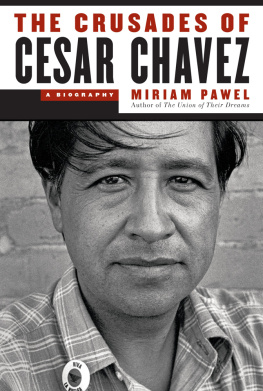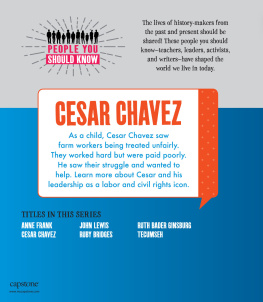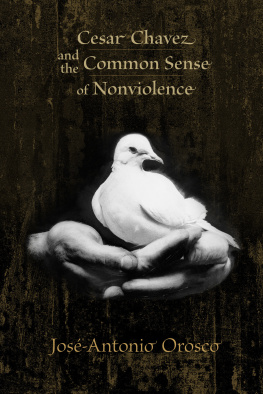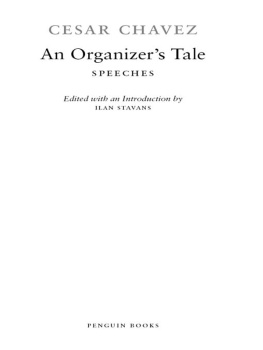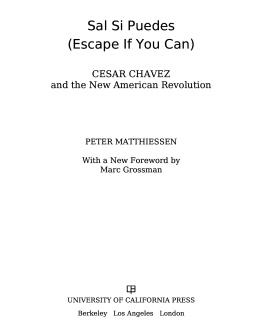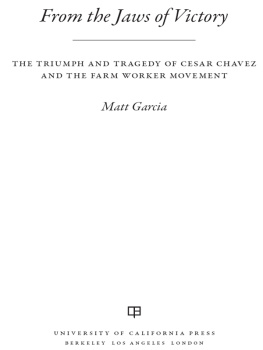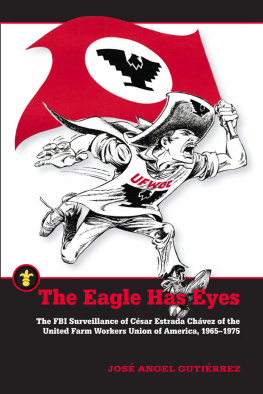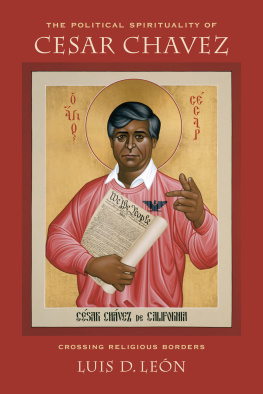I am grateful to all the people who helped me over the last nine years to understand Cesar Chavez, who educated me not only about the farm worker movement but about agriculture, labor unions, organizing, social movements, California history, Catholicism, and Mexican culture. If I tried to thank everyone, I would surely leave some out. Many are cited in the list of interviewees; some whose contributions were immeasurable do not appear. My profound thanks for all the conversations and insights, the cups of tea and the glasses of wine.
I am indebted to those who made the history, and to those who preserved it. I am grateful that Cesar Chavez recognized the historic nature of his quest and that advisers such as LeRoy Chatfield and archivists such as Philip Mason helped preserve the documentation. Chatfields work both in the early days of the movement and in more recent years has provided scholars with an invaluable resource. I owe special thanks to the staff at the Reuther Library at Wayne State, who have over the course of almost a decade of visits been unfailingly helpful and supportive, often under trying circumstances. My thanks to Elizabeth Myers, William LeFevre, and, especially, Mary J. Wallace, for her patience and unflagging help in untangling the audio archives that were so crucial to my research.
Jeffrey Burns at the archives of the Archdiocese of San Francisco guided me not only through relevant collections there but pointed me to others. Thanks also to Kevin Feeney, archivist at the Archdiocese of Los Angeles, and to Polly Armstrong and Ignacio Ornelas at the Green Library at Stanford. Several colleagues graciously shared observations and research. Thanks to Felipe Hinojosa, Gabriel Thompson, and Bruce Perry.
A fellowship from the National Endowment for the Humanities enabled me to complete my research. A two-week stay at Mesa Refuge was a writers dream.
For the photographic display, Im indebted to Mary Wallace and to Wendy Vissar, whose creative counsel and technical expertise helped shape a compelling visual narrative.
Writing is a solitary pursuit, but I had a wonderful support team. My agent, Gloria Loomis, believed in the book from the beginning. At Bloomsbury, Im indebted to Laura Phillips, Rob Galloway, and especially to Peter Ginna, whose thoughtful editing and guidance made this a far better book. John Hoeffel caught errors that no one else did. My three readers helped me think through both what I wanted to say and how to say it; many thanks to Sam Enriquez, Geoff Mohan, and above all to my husband, Michael Muskal, for his wise counsel and enduring faith and encouragement.
Thanks to everyone who understood the importance of this biography, and especially to those who trusted me to tell the story of someone who changed their lives.
Miriam Pawel is the author of The Union of Their Dreams , widely acclaimed as the most nuanced history of Cesar Chavezs movement. She is a Pulitzer Prizewinning editor who spent twenty-five years working for Newsday and the Los Angeles Times . In 2013, she was awarded a National Endowment for the Humanities fellowship. She lives in Southern California.
This book is drawn chiefly from the extensive array of primary sources available in more than a dozen public archives. In addition to written documentation, the UFW archives at Wayne State University include hundreds of tape recordings of union board meetings, conferences, and conversations. In the course of my research, I listened to more than fifteen hundred hours of tapes, including recordings of thirty national executive board meetings between December 1973 and December 1980. Several dozen additional tapes of conferences, staff meetings, interviews, and public events between 1967 and 1981 also provided rich source material.
Audiotapes made between 1969 and 1975 by Jacques E. Levy, Chavezs official biographer, are also an invaluable resource, documenting many key junctures in the unions history. A third important source of tapes is available on the Farmworker Movement Documentation Project website; I relied in particular on a series of interviews conducted by Fred Ross, mainly in March 1969 (the Fred Ross Sr. Oral History Archive).
I was also privileged to have access to private collections of several key participants in the farm worker movement. In addition, Bruce Perry, who conducted research on Chavez for several years, generously shared with me written material and more than two hundred interviews recorded in the mid-1990s.
Over the last seven years, I have interviewed more than eighty individuals who knew Chavez in a wide range of capacities. Those conversations helped me craft the biographical narrative and provided essential background. They are cited where relevant and a full list of interviewees is included. All quotations in the book, however, are drawn from primary sources.
Abbreviations
Abbreviations for individual archives follow their identification below. The Walter P. Reuther Labor Library at Wayne State University in Detroit is the repository for archives of the UFW and more than a dozen related collections. I use the following abbreviations for collections cited:
ADMIN | UFW Administration |
ADMIN3 | UFW Administration Part III |
CENT | UFW Central Administration |
DH | Dolores Huerta Papers |
GANZ | Marshall Ganz Papers |
INFO | UFW Information and Research |
NFWM | National Farm Worker Ministry |
NFWA | National Farm Workers Association |
OOP1 | Office of the President, Part I |
OOP2 | Office of the President, Part II |
OOP3 | Office of the President, Part III |
ROSS | Fred Ross Collection |
TAY | Ronald Taylor Papers |
UFWOC | United Farm Workers Organizing Committee |
UFWA | United Farm Workers Audio archives |
Other abbreviations in the notes and text:
NEB | National Executive Board of the United Farm Workers |
ALRB | California Agricultural Labor Relations Board |
ALRA | California Agricultural Labor Relations Act |
NARA | National Archives and Research Administration |
Archives
Jerry Cohen Papers, Amherst College Archives and Special Collections, Amherst College Library
El Teatro Campesino Papers, University of California at Santa Barbara (ETC)
Farm Labor Collection, Archives of the Archdiocese of Los Angeles, Los Angeles (AALA)
Field Foundation Papers, Briscoe Center for American History, University of Texas, Austin
Gerald Ford Presidential Library, Ann Arbor, Michigan
Herman Gallegos Papers, Special Collections, Cecil Green Library, Stanford University
Industrial Areas Foundation Records, University of Illinois, Chicago (IAF UIC)
Industrial Areas Foundation Records, Briscoe Center for American History, University of Texas, Austin (IAF Austin)
Jacques E. Levy Research Collection on Cesar Chavez, Yale Collection of Western Americana, Beinecke Rare Book and Manuscript Library (JEL)
Maricopa County Organizing Project Records, Arizona State University, Phoenix (MCOP)
Donald McDonnell/Spanish Mission Band papers, Archives of the Archdiocese of San Francisco, Menlo Park (AASF)
Ronald Reagan Presidential Library, Simi Valley, California
Fred Ross Papers, Special Collections, Cecil Green Library, Stanford University
Next page
